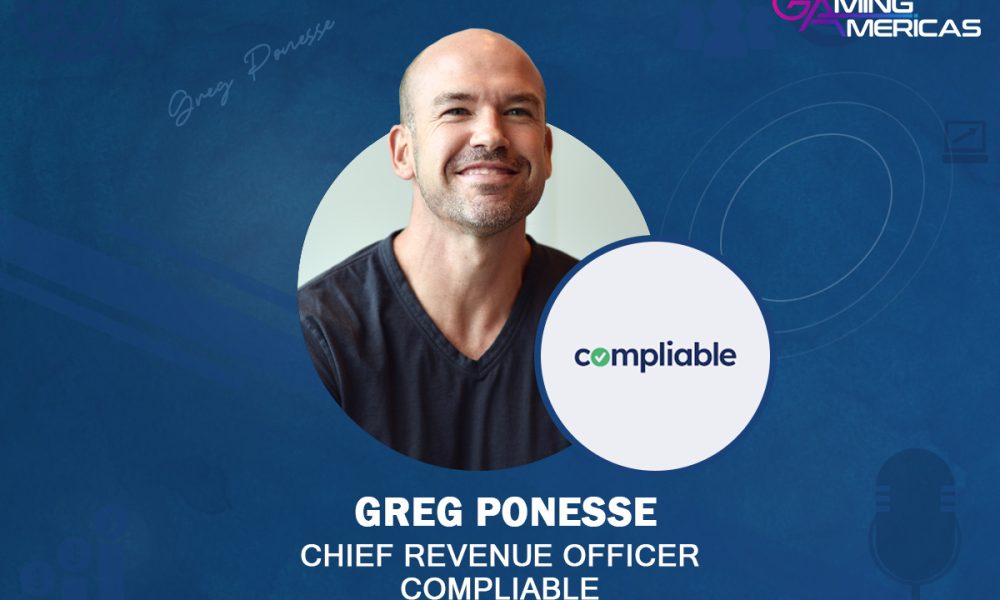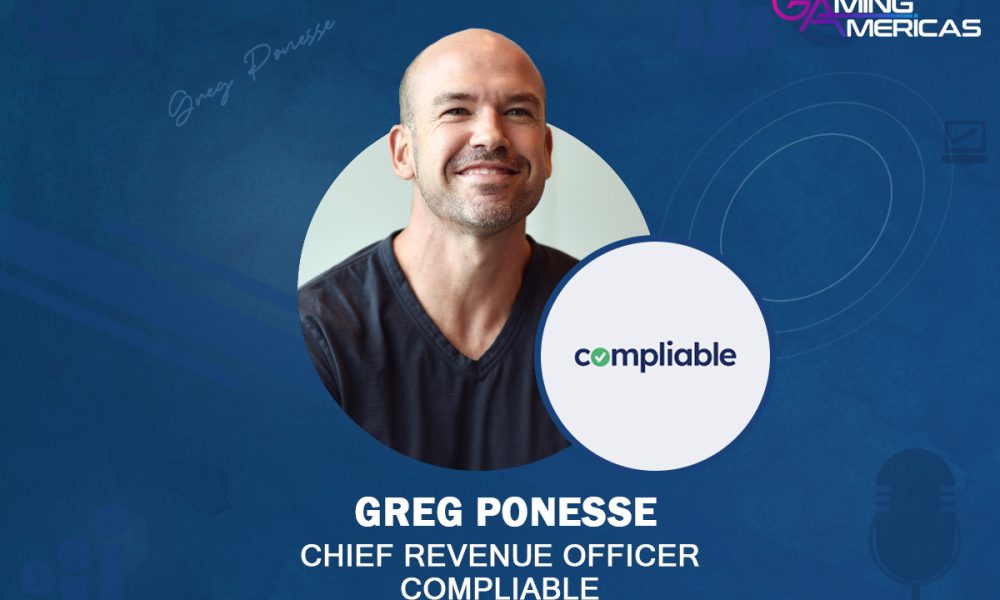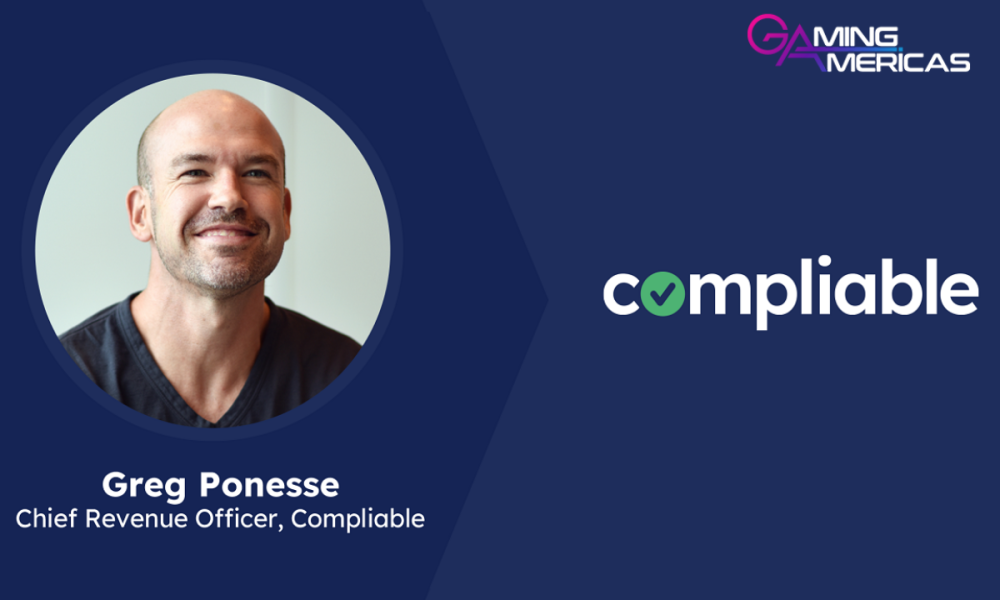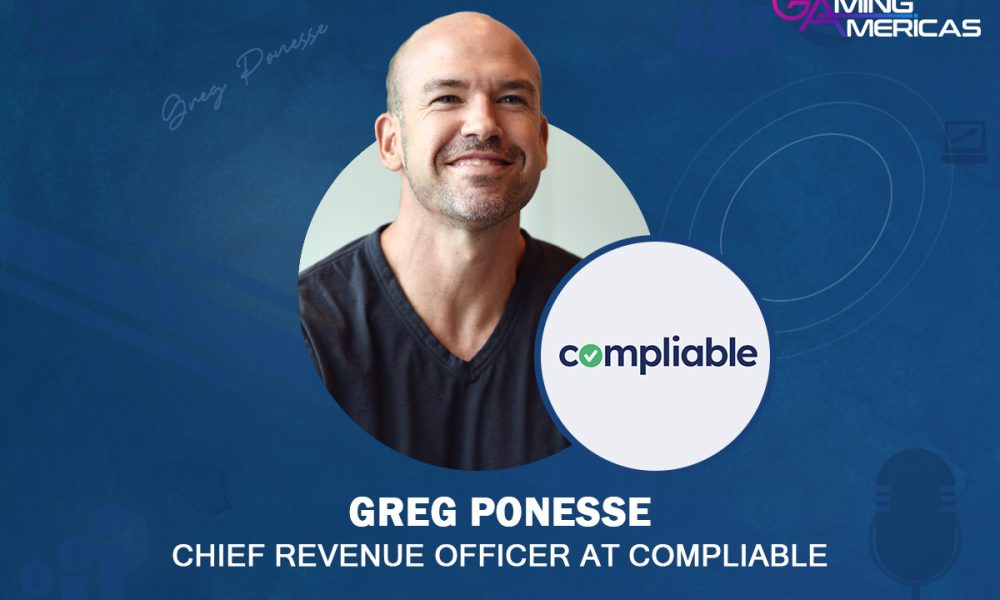Compliable
How suppliers can maintain a presence in the US space

While a lot of talk about the US betting and gaming markets have been around operators and the highly competitive climate, behind the scenes, suppliers are also battling for a slice of the cake.
From powering betting and casino offerings to providing games content, reg tech, and RG solutions, the US is a region with high potential for suppliers willing to invest time and resources.
We spoke with Compliable’s Chief Revenue Officer, Greg Ponesse, to discover more about how suppliers can establish a presence and achieve their goals in the US.
A lot of the recent focus on North America has been around operators and the tough competitive landscape, but how are suppliers faring?
Overall, suppliers are doing quite well. This is partly driven by the simple fact that all operators rely heavily on suppliers in one way or another to run their businesses. On the platform and content side, the big players such as Light & Wonder, Everi, Aristocrat and Playtech, are especially vital as their casino offerings keep operators progressing. In a way, they become the production engine for operators and help entice customers to the gambling sites.
Smaller content suppliers may have a tougher time to fight off the competition from well-established land-based US giants, but as the markets mature, we are likely to see an increase of newer studios in the casino lobbies.
Outside of the content sphere, there is plenty of excitement around suppliers of reg tech, responsible gambling solutions, geolocation platforms and KYC tools etc, which are crucial for operators to further grow their businesses, so I expect to see more growth in that area too.
How do the licensing requirements differ for suppliers in the US compared with operators?
Both must navigate a complex and often-changing regulatory landscape but operators usually require a more comprehensive type of license due to their direct interaction with consumers and handling of player funds, meaning more rigorous and stricter investigations and background checks. This can include scrutiny of financial history, research into key employees, and inspections around anti-money laundering practices and responsible gaming.
Providers of goods and services to the industry need different types of licenses, and often fewer ones, with less stringent regulatory requirements regarding operational procedures. They must however adhere to standards ensuring the integrity and security of their products and can face a more focused set of rules related to specific technical standards and testing requirements.
From a cost perspective, an operator’s market entry fee is typically markedly higher than a supplier’s, including steeper licensing fees and taxes.
Are there any challenges that suppliers need to be aware of before entering the space, especially coming from Europe? Any common mistakes?
The first thing to determine is what type of license is required, and we often see suppliers apply for the wrong license or licenses they don’t necessarily need. This slows down the process and can end up being costly, so getting some guidance around this is recommended.
There are major regulatory differences in the US compared to Europe, with laws varying by state, so suppliers must be ready to navigate this unique landscape. Common mistakes include underestimating the complexity and cost of compliance and licensing, not adapting products to specific consumer tastes, meeting the legal requirements of different US states, overlooking the importance of local partnerships and networks, failing to have a robust plan for payment processing that complies with US regulations, and ignoring the potential for intellectual property disputes.
The overall licensing procedure is lengthy and complicated so European providers need to be prepared for detailed background checks and long waiting periods. To avoid any difficulties, companies must be fully committed and ready to adapt and comply with all the rules and regulations in the US.
Will the investment be worth the rewards for suppliers entering the US or is the local competition too hard?
From a traditional game perspective, the US has some well-established suppliers with a long history in the land-based sector and they are doing extremely well. There are however European suppliers who are also popular in the US market. In order to be successful, it is all about competitive differentiation as that is what operators are looking for. Evolution is a great example of this. As a fairly late market entry, they have still managed to stand out and is now dominating the live casino space with an unparalleled offering.
Many European suppliers have been in the market for a long time, so they have the knowledge and experience that can give them a competitive edge as they enter the US. It does take a lot of resources and investment but if you have a truly innovative product, you can make a mark.
How can Compliable help suppliers in the space?
We provide speed and accuracy and enable companies to keep up to date on what licenses are required. Our scalable platform allows employees to securely enter their information just once, with the data then being auto-populated across multiple forms and applications, making it simple to apply for different jurisdictions at the same time. Compliable keeps users aware of the licensing journey and offer FAQs and 24/7 help throughout.
We accelerate the licensing process for both operators and suppliers, giving them a competitive advantage in an industry where the first movers retain larger market share. Speed is just as important for suppliers who must keep up with the expansion of their operator partners, and we can offer that necessary support.
Compliable
Reputation matters – the importance of supplier licensing

More and more jurisdictions are introducing licensing for B2B providers in an attempt to boost regulatory oversight and restrict black market activity with Sweden and Denmark recent examples. In this piece, we talk to Greg Ponesse, Chief Revenue Officer at Compliable, about how the increased compliance burden can favour suppliers’ standing in the iGaming ecosystem.
Have you seen a shift in attitudes from suppliers to only provide products in regulated markets?
We have seen that suppliers that have traditionally taken a .com approach are starting to move towards being licensed to secure additional revenue and more customers but also to improve their overall reputation and standing. The perception of brand integrity plays a big part of the decision-making process because some operator partners might be reluctant to work with suppliers if they have a mainly grey-market approach.
In the US, supplier licensing has always been the norm, so where we are seeing attitudes changing is primarily with European suppliers. Although most suppliers might have a few licenses that they need to manage in key markets, they are now better understanding the importance of being seen as fully compliant across the board as regulation changes and operators are looking for trusted partners.
Some of these brands are massive enterprises who are now trying to get a handle on how to manage all their licenses across multiple regions, and we have seen an increased interest in our software to support that.
What has been the driving force for this – regulator pressure or business strategy?
It’s a little bit of both. Regulator pressure is definitely a big one as gambling becomes more ubiquitous and mainstream. It’s the responsibility of the government to provide structure and regulation to ensure safety for consumers and many are starting to realize that suppliers play an equally important role in that as operators. We have recently seen examples of locally licensed suppliers being fined by regulators for offering their products to unlicensed operators, so providers need to be on the ball to ensure their reputation stays intact.
That said, the grey market suppliers up to this point have stayed in grey markets because that’s what was available to them. Now you’re seeing new markets opening up like North America, which has been huge, where all states require suppliers to be licensed. These grey market players that have previously focused on Europe now see that there’s revenue over there to be gained, so they need to pull up their socks and play the game.
As a business strategy, suppliers can only remain in black markets for so long, avoiding paying taxes and declaring revenue. In a competitive marketplace, suppliers can definitely benefit from being more established and having numerous licenses. Operators might be wary to work with companies that don’t take compliance seriously so being able to show that you have X number of licenses and that you have infrastructure in place shows that you’re serious, and that you know what you’re doing. It kind of sets the table for you to have a soft landing and to be able to begin those discussions with potential partners.
A sole focus on regulated markets would suggest a negative impact on profits so what benefits do suppliers see from being licensed?
If the train is only going in one direction, you eventually have to hop on it. Moving away from grey markets will inevitably have a negative impact on profits but you then have to look at where you can find additional revenue. If you are a licensed supplier, it does allow you to work with the big local operators. You have to decide on whether you can make more money as a grey-market supplier or by going into markets being licensed and making the most of what that offers.
Do you expect more jurisdictions will introduce B2B licensing going forward?
Yes, for sure. Gambling is ubiquitous now and governments recognise that it’s a great revenue generator for them and it also helps with ensuring responsible gambling. With licensing, you provide a framework, infrastructure, and environment that is safe, and it ensures that everyone is on a level playing field. That needs to include all different sides of the industry such as operators, suppliers, affiliates etc. If everyone in the ecosystem follows the rules, it will be a better place for all.
What are the big challenges that suppliers face when it comes to licensing in 2024 and beyond?
Your licensing strategy, so basically, where you are going to go get licensed. This process takes time and resources, and you want to make sure you are prepared before you start talking with operators. They will want to know, just like as with any other vendor, if you are licensed as a supplier.
If we use the US as an example, there is no shortage of suppliers that want to partner with the available operators, so you need to know who you want to work with and where, and then you have to make sure you sort those applications properly. That is all about getting the right advice or using software because if you fail the process, you will end up at the back of the queue and your go-to market strategy will be delayed.
What, if any, are the key differences between licensing in the US and regulated markets in Europe and other regions around the world?
For starters, every state in the US acts as if it is its own country and the licensing process is very complex and rigorous. In Europe, it was initially somewhat more relaxed. You got your Malta licence, and that was then good for all countries in Europe. We’re now seeing a bit of backtracking, with more and more countries getting tougher on rules and regulation.
Increased supervision, with regulators having more oversight, means there is no hiding and I think that is what we’re moving towards on a global scale.
I do believe that most suppliers and operators prefer a regulated market because it separates proper companies from the bad ones. If I was a large operator or supplier that invested time and money into licensing and establishing a compliance team, I would feel good about that because there are so many companies that can’t do it. There’s this element of pay to play, so to speak, in order to really maximize your profits in a region.
Compliable
The Art of Staying Compliant w/ Greg Ponesse, Chief Revenue Officer at Compliable

How can operators and suppliers best ensure that they stay on track of ever-changing rules and regulation once they are live in a market?
Fundamentally, it’s about keeping a finger on the pulse of the market and curating a broad network of industry sources to ensure that you are up to date on any new developments. Industry press releases, newsletters and magazines are all excellent places to begin, and getting into the habit of checking regulator websites on a monthly basis is a good next step. In general, regulators maintain open communication with the public concerning new regulations; as it’s rare to have a dedicated contact person from any given agency checking in to ensure that you’ve kept up with any updates, however, it will still fall to you to make sure that you’re keeping current with any changes. Ultimately, it is always the responsibility of the licensee to ensure that it is compliant and, if mistakes are made, there are rarely, if ever, any get-out-of-jail-free cards.
Additionally, building a network of compliance professionals that you can reach out to on short notice can be a huge help, as urgent situations can arise without warning and require you to react quickly. It’s not always possible for every company to field an in-house compliance team that can deal with every request and change, even if that would be very preferable, so having experts just a call away is always a smart choice.
Compared with entering a market, how time consuming is maintaining compliance for teams?
While entering a new market is complex, maintaining compliance is equally important, and introduces its own challenges of minutiae and attention to detail. Renewal windows need to be carefully monitored, new regulations need to be constantly observed, and required updates need to be passed on to regulators in a timely manner.
These challenges are true no matter the size of the company in question. A small company could be licensed in 16 regions, with one person managing the process for all those markets. In such a case, that one person would probably need to spend a decent portion of their work days just to ensure that compliance was being maintained across all those markets, even if the individual number of licenses was low. A large company operating in fewer locations, on the other hand, might have thousands of employees and licenses to maintain for that location, and not one of those employees or licenses could be allowed to fall through the cracks. Each license would need to be tracked, and each renewal dealt with in a timely fashion. In either case, maintenance of compliance should be expected to take up a sizable amount of time.
Are there common mistakes that occur and what impact can this have on operations?
At the risk of sounding reductive, the most common mistakes are not filling out the application correctly or failing to include the correct documentation. Attention to detail matters so much in the process and taking the time to parse what can often be very complex sets of instructions is critical.
No matter the type of licensure, there is always going to be a large amount of information and documentation required, and making sure that you have all of that information and documentation at the ready before you begin is also critical to your success in the process.
Most simply, you could equate the process to that of buying a house. Everything needs to be in order before you place your bid, or it will fall through and someone else will likely swoop in and take the house right out from under you. It’s more or less the same when a company is going through the licensing process. If everything isn’t in order, you might have to wait a long time after submitting your initial application just to be told that something is wrong or missing. Once those issues are corrected, you would have to resubmit the application, starting from the back of the queue again. This would obviously delay the issuing of a license in an industry where first-mover advantage is crucial.
How can tech solutions help teams stay compliant once they are live in a market?
There are many ways in which such solutions can assist with compliance. Our platform, for example, allows you to input all of your information and upload all your documents exactly once, and to then output that information to multiple forms at the same time. It also tracks the application status, which can be very challenging to handle on your own if you are active in numerous regions or have a lot of employees. Furthermore, it reminds you of expiration dates, so you can be well prepared and organized when the time comes for renewals. Finally, because we store your information, you are also not required to re-enter all of your information year after year, making the renewal process much more efficient; you will only have to update information if the regulator has changed their forms, otherwise, everything will slot right in where it belongs.
We put an immense amount of effort into ensuring that our forms and other documents are kept up to date with all regulatory requirements and guidelines. Thus, when you use our service to generate forms for any application or renewal, you can be assured that you are filing the correct forms, and that all the questions on that form have been filled out correctly. In short, using our platform ensures that compliance teams can focus on other important tasks while resting safe in the knowledge that their licensure forms have been completed correctly, and that their licenses and renewals are being effectively tracked.
American Gaming Association
Reg-tech – Easing the burden on compliance teams

Greg Ponesse, Chief Revenue Officer at Compliable
The year is coming to an end, and we can look back at an interesting 12 months that have seen the US betting and gaming landscape further expand into three new states, Vermont, North Carolina and Kentucky.
The American Gaming Association (AGA) recently released numbers that showed commercial gaming revenue was boosted in Q2 of 2023, hitting a record of $16.07bn. The impressive results marked the 10th consecutive quarter of growth for the industry.
Yet, some operators have had to navigate through choppy waters, with news stories from the last 18 months including Churchill Downs, MaximBet, PlayUp, Fubo, FOX Bet and WynnBet closing or pulling out of states as they struggle with profitability.
Sports betting, the main legalized vertical in the US, is such a low margin business that the ability to save money anywhere in operations is so important. Competition is extremely high, and the sports betting markets in the majority of legalized states have been dominated by a handful of behemoths such as DraftKings and FanDuel.
While these operators have large compliance teams to cope with the fragmented regulatory landscape that exists across states in the US, smaller to medium-sized companies have fewer resources to handle ever-changing regulations while also preparing for new states opening up.
Historically, if not handled by an internal team of compliance staff, regulatory issues were simply given to outside counsel with their associated high legal fees. Furthermore, overstressed smaller compliance teams leave room for mistakes as a result of human error which can lead to large regulatory fines.
The number of reg tech solutions now available in the gambling space can be hugely beneficial and can drive down costs in a number of ways, with one of the major advantages being that companies can benefit from compliance work that is being done in one market across similar jurisdictions.
Despite a lack of common regulatory approaches in legalized US states, there are still many similar obligations, and with technology, the process to complete these tasks can be automated. Licensing of employees and reporting of revenues or other data are common compliance duties that most regulators require. This type of requirement can easily be handled by technology rather than employees, significantly increasing efficiency, and freeing the team to focus on higher level problems which can be critically important when launching in new jurisdictions.
Simply put, reg tech allows a smaller team to operate with the same skills and efficiency as a much larger team and can help cut costs while still maintaining operational compliance.
Even if fewer US markets are currently opening up compared with a few years ago, successful gambling operators and suppliers are targeting multiple states at a minimum. We have passed the point where any one person can be an expert on every gambling jurisdiction’s requirements and tech is a necessary component to help manage the processes.
As 2024 is approaching, we will see further regulatory developments in the US betting and gaming space and more consolidation cannot be ruled out as operators grapple with being profitable in a hyper competitive sector.
Reg tech can play an important part, cutting costs while streamlining and simplifying processes and procedures, helping operators to succeed in the exciting US market.
-
Latest News3 weeks ago
The winners of the Casino Guru Awards 2025 announced: A night of celebration, integrity, and inspiration
-

 Latest News3 weeks ago
Latest News3 weeks agoThat was unforgettable! – The Boomerang Bet “AC Milan vs. Bologna Trip” Instagram Giveaway winner shared his emotions
-
Compliance Updates4 weeks ago
New Zealand Government Releases Refreshed Strategy to Prevent and Minimise Gambling Harm
-
Asia3 weeks ago
Max Level Wins PR Mandate for Riot Games in India and South Asia
-
Latest News3 weeks ago
Week 23/2025 slot games releases
-
Compliance Updates3 weeks ago
Digitain’s Paydrom Receives PCI DSS Certification
-
Latest News3 weeks ago
DATA.BET Rolls out Full-Service Sportsbook Solution
-

 Latest News2 weeks ago
Latest News2 weeks agoAtlaslive Analysis: European Gambling Market Enters €123.4 Billion Digital-First Era












